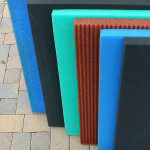It seems that this foam has an ammonia and nitrite reduction capacity that is enormously superior to normally used biomedia, as its structure is able to host a far superior bacterial community. It also does not decompose, is easy to clean and does not release silicates and aluminum like sintered glass.
The only doubt I have is whether the bacteria that work in the absence of oxygen are able to settle sufficiently in the deeper layers of the foam panel, to close the nitrogen cycle (from no3 to nitrogen gas) and therefore not risk a accumulation of nitrates in the tank.
Does anyone have experience with this? It would be an excellent solution to save on live or synthetic rocks, both economically and to have slimmer rocks in the aquarium and less clogged sumps.
I will link you to both the studio and the company that distributes these polyurethane panels (manufactured in Europe), where there is also the diagram for positioning them in the sump.
Sorry for the Google Translator English...
 aquariumscience.org
aquariumscience.org

 www.swisstropicals.com
www.swisstropicals.com
The only doubt I have is whether the bacteria that work in the absence of oxygen are able to settle sufficiently in the deeper layers of the foam panel, to close the nitrogen cycle (from no3 to nitrogen gas) and therefore not risk a accumulation of nitrates in the tank.
Does anyone have experience with this? It would be an excellent solution to save on live or synthetic rocks, both economically and to have slimmer rocks in the aquarium and less clogged sumps.
I will link you to both the studio and the company that distributes these polyurethane panels (manufactured in Europe), where there is also the diagram for positioning them in the sump.
Sorry for the Google Translator English...
7. Aquarium Filter Media
The media in an aquarium filter is the most important variable when setting up a filter.
 aquariumscience.org
aquariumscience.org

SwissTropicals Poret ® Foam - SWISSTROPICALS
Poret ® foam is a polyether foam with resistance to acids, bases, hydrolysis, and other forms of chemical attack encountered in aqueous environments.

















